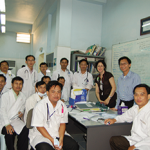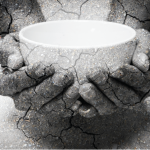It’s one thing for a developing country to lack physicians due to a scarcity of training. It’s quite another for such a vacuum to exist because the physicians were executed. In Cambodia in the 1970s, genocide perpetrated by the Khmer Rouge spared few of the educated class. If they were spared, chances were they lost most, if not all, of their family members. In all, an estimated 1.5 million–2 million Cambodians died of starvation, execution, disease or overwork during that time.1
Against this somber backdrop, today’s Cambodian physicians attempt to help fellow citizens suffering with rheumatology problems, with some help from the outside world.
Victoria Seligman, MD, MPH, a rheumatologist and internal medicine physician at the Denver Veterans Administration and the University of Colorado, has volunteered in Cambodia for 14 years. “When the Khmer Rouge were done with Cambodia, by most accounts there were fewer than 20 doctors still alive in the country,” says Dr. Seligman. “The new government sent their best and brightest abroad to study medicine, so there is now a growing number of physicians in the country. There are still no fellowship-trained, government-licensed rheumatologists, however.
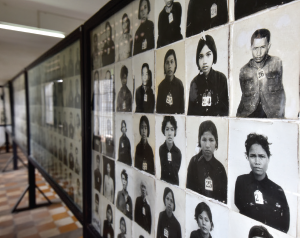
The Tuol Sleng Genocide Museum is a museum in Phnom Penh, chronicling the Cambodian genocide.
akturer; Peter Hermes Furian / shutterstock.com
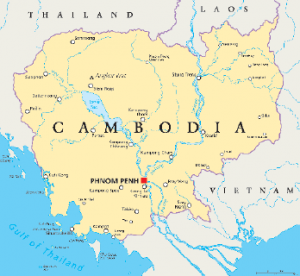
“In 2004, Health Volunteers Overseas asked me to start an internal medicine program in Cambodia at Sihanouk Hospital Center of Hope, a charity hospital that focuses on the very poor. Along the way, we have had several rheumatologists participate,” she says. “When I first started the program, things were totally different in that the system only served the very poor—and even that was by lottery. People would travel up to 10 hours on a bus and then sleep outside a hospital to await a lottery ticket. Over the years, things have evolved into a triage system, where fees are based on income. There are five categories—A through F—with those in the F category paying nothing at all.”
Lupus Is Deadly Here
In the West, rheumatologic conditions typically don’t prove fatal, but they can be in a country where the minimum wage is $153 (U.S.) a month.2 “Cambodia has the most severe lupus I have ever seen,” says Dr. Seligman, who has worked in several developing nations, as well as with underserved U.S. populations. “There are layers of complexity involved, in part because of poverty, and in part because doctors don’t know if patients will/can comply with instructions. Because of the expense, people will take half of a half of a pill. And each dialysis session [costs] $180, so patients try to spread them out—if they can even go at all.
“The rheumatology program at Sihanouk Hospital Center of HOPE, based in Phnom Penh, came about because I was completely astounded by the severity and broad spectrum of pathology, including scleroderma, lupus and rheumatoid arthritis (RA),” Dr. Seligman says. “Kidney disease among lupus patients is rampant, and there is no dialysis unless patients seek assistance in the private sector. These patients die, and they die young.”
In Cambodia, a despot no longer hands down death sentences; untimely death now comes via poverty and myriad other life circumstances. “When I first went to Cambodia, they had no steady supply of any medications, and they were scared to use the basic drugs they did have on rare occasions, such as methotrexate,” Dr. Seligman says. “The situation is likely made worse by genetics; we see a lot of young women with lupus getting kidney disease and systemic manifestations, including neurologic and cardiovascular manifestations.”
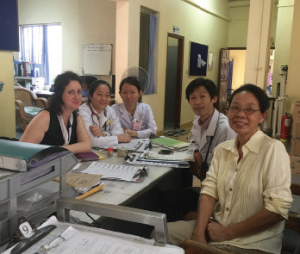
Dr. Seligman (far left) at a Cambodian hospital with other doctors and students.
Asked about RA, Dr. Seligman says, “Even though ours is not a pediatric hospital, we have occasionally had children wheeled in who have clearly been suffering [from] juvenile arthritis, but they had never been diagnosed. At Sihanouk Hospital Center of HOPE, arthritis patients can be diagnosed and, depending on their economic situation, treated early. Fortunately, methotrexate is now readily available, and the physicians are comfortable with its use (although this is not the case in rural areas). At this time, there is only one biologic available in the country—Actemra (tocilizumab)—and it costs $800 a month. These patients have very severe disease; they present with nodules, meaning that it is a skewed population.
“Gout is also prevalent, but at least that condition—as well as RA—can be treated well now with a regular supply of old school medications, such as colchicine, prednisone and non-steroidal anti-inflammatory drugs—many of those are available.”
Training, Training, Training
Exacerbating the bleak situation, says Dr. Seligman, is that due to a lack of training, many practitioners—including traditional medicine providers, pharmacists and physicians—who remain outside the urban areas often underdiagnose or miss conditions such as lupus. “There is a lack of medical education regarding lupus and other arthritides, and patients often seek assistance from pharmacists or other providers for first-line care, which until very recently has been unregulated,” she says. “Patients often get prednisone-containing medications from a pharmacist, and then by the time they go to a hospital they have been on it for years; by that time, it is often too late to prevent the long-term sequelae. There are other medications and antibiotics often dispensed. It is impossible to really know what they get.
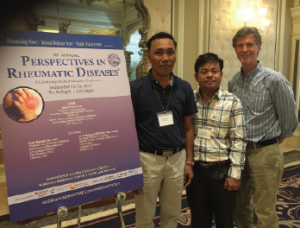
Dr. Khun (far left) attended a continuing medical education program on rheumatology this fall in Las Vegas.
“There are now four medical schools in Cambodia, [but] there doesn’t seem to be much of a focus on rheumatology,” Dr. Seligman says. “What gives me hope, however, is that through the years, the overall rheumatology knowledge level of trainees has improved substantially.
“Cambodia is extremely fortunate to have Rithya Khun, MD, a highly trained physician who specializes in rheumatology and is chief of staff at Sihanouk Hospital Center of HOPE since 1999,” Dr. Seligman says. “He has attended a number of international training courses and will soon be coming to the U.S. with a junior physician to work briefly in a rheumatology practice.”
‘When the Khmer Rouge were done with Cambodia, by most accounts there were fewer than 20 doctors still alive in the country.’ —Dr. Seligman
Still, Cambodia needs a formalized training structure, Dr. Seligman says. “Kevin Pile, MD, a past president of APLAR [the Asia Pacific League of Associations for Rheumatology], put together a team that came and conducted training for two weeks at the medical school level several times a year. Several academic centers across the globe have joined together for a telehealth program in Cambodia that provided the rural areas with access to vital information. This effort wasn’t tenable in most cases, however, because there were no laboratory facilities in many sites, and diagnoses and treatment were challenging with this format. As for Dr. Khun, he is incredibly busy with both rheumatology and internal medicine clinics and thus has little time to devote to creating a formal training program.”
The suffering in Cambodia—physical and mental—runs deep. “The legacy of the genocide is an unimaginable level of post-traumatic stress disorder. This is true for the doctors and patients. In most cases, the underlying trauma and depression have gone totally unaddressed. I will say the level of support physicians provide one another is like something I have never seen. These doctors truly take care of each other.”
And although they do their best, even being a physician couldn’t save one patient from death. “One of the doctors at our hospital, Mar Rithy, MD, had severe, untreated RA when I first met him in 2004,” Dr. Seligman says. “We started him on methotrexate and taught him how to use it. Unfortunately, his case was very complex. He developed interstitial lung disease, his health worsened, and he succumbed to tuberculosis. The infectious milieu in his case—as with many patients—is always a tremendous concern. Dr. Rithy emailed me with questions about further advanced treatment, but tragically, I had nothing to offer at his stage of disease. When he passed away, I attended a memorial ceremony at the hospital, and several physicians pooled our money to help defray his family’s funeral costs, a traditional gesture among the staff at this hospital that speaks to the strength of the community. I think of him every time I teach rheumatology in Cambodia.”
Fight the Good Fight
Dr. Khun knows what challenges await him each morning, and he shows up anyway. A champion of hope, Dr. Khun saves his evenings for rheumatology lectures.
“Our universities have training programs for dermatologists, cardiologists and others,” Dr. Khun says. “So far, we have none for rheumatology. Along with two other physicians who are interested in rheumatology, I train the junior doctors.
“Compared to the past 10 years, I can say there is a bit more rheumatology knowledge, and in the cities doctors are able to make diagnoses earlier,” Dr. Khun says. “For the most part, however, by the time patients reach us, they are very sick. In addition, we lack the capacity for reasonably priced immunology tests.
As for treatment standardization, Dr. Khun says, “There are no national guidelines for rheumatology conditions. I earned a certificate from the European League Against Rheumatism, so we follow those guidelines, as well as those of the American College of Rheumatology.
“In Europe, patients come in early during the disease process, and the doctor can do lots of tests; they can get the right diagnosis at the right time,” Dr. Khun says. “Here, patients come in later during the disease, they are incredibly sick and [they] can’t afford treatment or tests. And in Europe, if someone has an infection you send them to the infectious disease doctor; here, I have to do it all.”
Elizabeth Hofheinz, MPH, MEd, is a freelance medical editor and writer based in the greater New Orleans area.
Acknowledgments
Drs. Khun and Seligman acknowledge the following individuals for their dedication and exemplary efforts in caring for those with rheumatologic problems: Kim Meng, MD, executive director of HOPE Worldwide Medical Centers; Lim Kruy, MD, SHCH chief of medicine and director of education and research; Gary Jacques, MD, HOPE worldwide director of development in Cambodia; Thai Sopheak, MD, executive director of the Sihanouk Hospital Center of HOPE; and Health Volunteers Overseas.
Rheumatologists interested in volunteering can contact Health Volunteers Overseas or Dr. Seligman via email ([email protected]).
References
- Pol Pot. History. 2009.
- Cambodia minimum wages. Trading Economics. 2017 Aug.
